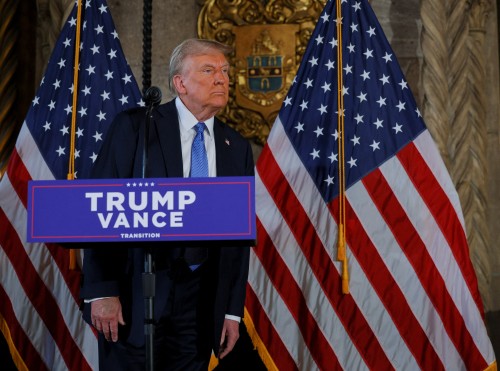By Jason Lange
WASHINGTON (Reuters) – About two in five Americans view U.S. President-elect Donald Trump favorably, fewer than when the Republican was on the cusp of his first presidential term, a new Reuters/Ipsos poll showed.
Some 41% of respondents in the three-day poll, which closed on Sunday, said they viewed Trump favorably, while 55% viewed him unfavorably as his Jan. 20 inauguration approached.
That was down from Trump’s 51% favorability rating in December 2016 after his stunning victory in that year’s election, even though for months he had garnered ratings around 40%. The post-election boost carried into the initial months of his 2017-2021 term.
The absence of a bounce this year – his favorability ratings have hovered around 40% in recent months – could be a sign of deepening political polarization between Republicans and Democrats. In December 2016, about a quarter of Democrats viewed Trump favorably. This month, only about one in 10 did so.
Early in Trump’s first term, his presidential job approval ratings reached a high of 48% in Reuters/Ipsos surveys conducted between February and April of 2017.
By mid-2017, amid accusations that Trump mishandled classified documents and pressured a top law enforcement official to stop probing his campaign’s alleged ties to Russia, the Republican’s approval ratings fell to around 40% and largely stayed there for the rest of his term.
Current President Joe Biden entered office in 2021 with a 55% approval rating but the Democrat’s popularity has also slipped, hovering close to 40% since early 2022 following a chaotic military withdrawal from Afghanistan and as consumer prices surged.
The Reuters/Ipsos poll that closed on Sunday showed approval of Biden at 38%, just above the lowest level of his term, 35%, in October.
Trump’s lowest approval rating during his first presidential term was 33% in December 2017.
The latest poll, conducted online and nationwide, gathered responses from 1,031 U.S. adults, with a margin of error of about 3 percentage points.
(Reporting by Jason Lange; Editing by Scott Malone and Richard Chang)


